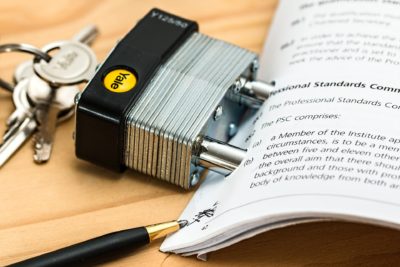Companies seeking to do business with state and local government in Florida need to know that the solicitation process, up to and including entering into the final contract, requires a significant degree of transparency because of the state’s very broad public records and open meetings laws, collectively known as “government in the sunshine.” At the same time, because the government contracts market is highly competitive, companies responding to requests for proposals and other solicitations must be able to keep their trade secrets out of the hands of competitors.
 Recognizing the need to balance business interests with the public’s right to access government records—a right derived from the state constitution—the Florida Legislature in 1994 enacted section 815.045, Florida Statutes, which expressly makes trade secret information held by a public entity “confidential and exempt from the public records law.” In the world of government contracting, the question of whether certain information is a trade secret can be a contentious one.
Recognizing the need to balance business interests with the public’s right to access government records—a right derived from the state constitution—the Florida Legislature in 1994 enacted section 815.045, Florida Statutes, which expressly makes trade secret information held by a public entity “confidential and exempt from the public records law.” In the world of government contracting, the question of whether certain information is a trade secret can be a contentious one.
To protect trade secrets from potential disclosure under the public records law, a company bidding for government business or contracting with a government entity must specify which information given to the entity is a trade secret. However, in the event of a public records request, neither the company nor the government entity has the last word on what is and isn’t a trade secret, and what can and can’t be disclosed. Rather, the courts have the final say. And while the public records law is construed liberally, exemptions from the law are construed narrowly.
What is a trade secret under Florida law? For purposes of the public record disclosure exemption, section 812.081(1)(c), Florida Statutes, defines “trade secret” as:
The whole or any portion or phase of any formula, pattern, device, combination of devices, or compilation of information which is for use, or is used, in the operation of a business and which provides the business an advantage, or an opportunity to obtain an advantage, over those who do not know or use it. The term includes any scientific, technical, or commercial information, including financial information, and includes any design, process, procedure, list of suppliers, list of customers, business code, or improvement thereof.
In addition, any such information must be: (1) secret; (2) of value; (3) used in or by the business; and (4) “of advantage to the business, or providing an opportunity to obtain an advantage, over those who do not know or use it.”
Courts also look to the Florida Uniform Trade Secrets Act (“FUTSA”), which provides civil remedies for misappropriation of trade secrets. Under FUTSA—specifically, section 688.002(4), Florida Statutes—a trade secret is “information, including a formula, pattern, compilation, program, device, method, technique, or process that derives independent economic value, actual or potential, from not being generally known to, and not being readily ascertainable by proper means by, other persons who can obtain economic value from its disclosure or use; and is the subject of efforts that are reasonable under the circumstances to maintain its secrecy.”
A recent decision from the Fourth District Court of Appeal, Raiser-DC, LLC, v. B&L Service, Inc., illustrates what the court described as the “battle between government transparency and entrepreneurial confidentiality.”
Raiser-DC, LLC (a/k/a Uber) has a license agreement with Broward County to provide transportation service at the Fort Lauderdale-Hollywood International Airport and Port Everglades. Under the agreement, Uber must provide the county monthly reports containing the aggregate number of pick-ups and drop-offs at each location and the total fee (based on pick-ups and drop-offs) paid by Uber to the county. The reports also include specific information for each pick-up and drop-off, “including a time stamp, the longitude and latitude, and the first three characters of the driver’s license plate which identifies the individual.”
Yellow Cab made a public records request to Broward County seeking all of Uber’s reports. Because Uber had designated the information as trade secrets, the county released only redacted versions of the documents. Yellow Cab sued the county to obtain the unredacted reports, and Uber intervened. The trial court ruled that, although the specific information Uber reports about individual pick-ups and drop-offs does constitute confidential trade secret information, the aggregate number of trips by Uber to and from the airport and seaport and the resulting usage fees are not trade secrets, and thus, are not exempt from public records disclosure.
On appeal by Uber, the Fourth District agreed with the lower court, holding the aggregate information on Uber’s trips and usage fees “do not meet the definition of trade secrets under sections 688.002(4) or 812.081(1)(c), Florida Statutes [because] nothing indicates the fees or total pickups provide an advantage to Yellow Cab or that Uber derives independent economic value from keeping that information secret.” The court explained:
The dollar figure along with the number of pick-ups does not reveal Uber’s fare pricing or revenue. Payment to the driver, cost to the rider, and revenue to the company differ for each of Uber’s services. Without knowing the level of service provided, a competitor would not know the type of riders being serviced.
In reaching its decision, the appellate court cited several non-Florida cases which have held, e.g., that Lyft’s (a rideshare service like Uber) commissions and revenue are not trade secrets, and that a corporation’s sales volume, income statements, and gross sales are not trade secrets.
There are three main takeaways from Raiser-DC, LLC for companies vying for government business in Florida. First, because the state’s policy and laws give broad public access to documents held by government entities, competitors can—and often will—obtain information you would rather they not have. Second, while proprietary information like pricing models satisfies the statutory trade secret definitions, aggregate information like revenue likely will not, unless it would allow a competitor to discern proprietary information. And third, when designating information as a trade secret, carefully consider whether the information has independent economic value because it is not known to competitors. Being able to articulate that element of the trade secret definition early on can increase the likelihood of successfully shielding the information from a public records request later.
 Simone Marstiller is a former First District Court of Appeal judge and state agency head. She is an appellate litigation and government affairs consultant with Gunster, and is a member of Gunster’s government procurement practice group.
Simone Marstiller is a former First District Court of Appeal judge and state agency head. She is an appellate litigation and government affairs consultant with Gunster, and is a member of Gunster’s government procurement practice group.


